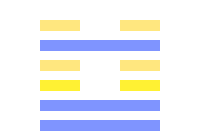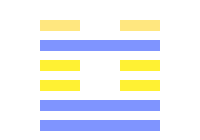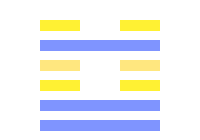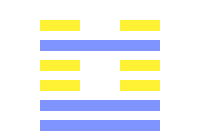Yi Jing Hexagram 60 - Line 3
The hexagram: 60
An hexagram is a combination of six yin and yang lines.

60.3 (60 > 5) - THE KIEH HEXAGRAM.
The third line, divided, shows its subject with no appearance of observing the (proper) regulations, in which case we shall see him lamenting. But there will be no one to blame (but himself).
Bing DeepL Google Yandex60.3 (60 > 5) - Curbing one' s appetite
One is too weak to feed one's group so one prepares to remedy one's addiction.
Bing DeepL Google Yandex60.3 (60 > 5) - Curbing one' s appetite
One is too weak to feed one's group so one prepares to remedy one's addiction.
Bing DeepL Google Yandex60.3 (60 > 5) - Tsieh, la délimitation
Tsieh : règle, loi, mesure.
Qui n’observe pas les lois s’en repentira suffisamment par la suite et se lamentera sans que personne ait besoin de le blâmer. (Ou bien : s’en repentira si amèrement que personne n’aura le courage de le blâmer.)
Bing DeepL Google Yandex60.3 (60 > 5) - Refréner son appétit
On est trop faible pour alimenter son groupe alors on se prépare à remédier à son addiction.
Bing DeepL Google Yandex60.3 (60 > 5) - Korlátozás
Túl gyenge hogy táplálja a csoportját így felkészül hogy felszámolja a függőségüket.
Bing DeepL Google YandexThe trigrams
The trigrams are combinations of three yin and yang lines. The three bottom lines of the hexagram form the lower trigram and represent the inner situation. The three top lines form the upper trigram and represent the outer situation.
trigSup

Lower trigram: The lake The sky


The nuclear hexagram: 27.2.4 (27 > 38)
The nuclear hexagram is the association of the two inner trigrams (lines 2,3,4 and 3,4,5). It represents the root, or the origin of the situation.

27.2.4 (27 > 38) - THE Î HEXAGRAM.
- 2. The second line, divided, shows one looking downwards for nourishment, which is contrary to what is proper ; or seeking it from the height (above), advance towards which will lead to evil.
- 4. The fourth line, divided, shows one looking downwards for (the power to) nourish. There will be good fortune. Looking with a tiger's downward unwavering glare, and with his desire that impels him to spring after spring, he will fall into no error.
27.2.4 (27 > 38) - Taking short vacations
One spreads out vacation periods to be able to regain strength several times a year.
Bing DeepL Google Yandex27.2.4 (27 > 38) - Taking short vacations
One spreads out vacation periods to be able to regain strength several times a year.
Bing DeepL Google Yandex27.2.4 (27 > 38) - I, l’alimentation
Ī : 1. Entretenir, soutenir ; 2. Menton, côté de la bouche ; 3. Profond.
- 2. Baisser le menton, c’est renverser les lois morales. Le lever vers les hauteurs, c’est aller au mal, au malheur. (Ces deux expressions désignent ceux qui font les parasites près des petits et près des grands — ou plutôt : ceux qui s’avilissent ou visent trop haut.)
- 4. Celui qui cherche la nourriture comme un tigre avançant pas à pas et regardant fixement, réussira en ses désirs.
27.2.4 (27 > 38) - Prendre des vacances courtes
On étale ses périodes de congés pour pouvoir reprendre des forces plusieurs fois par an.
Bing DeepL Google Yandex27.2.4 (27 > 38) - Ellátás
- 2. Nem keresi távol azt, amit megtalál a környezetében is.
- 4. Felméri a lehetőségeket.
The derived (Fan Yao)
The same line number on the mutated hexagram. It reperesents what can be done AFTER to correct the situation described by this line, as a sort of remedy or solution.

5.3 (5 > 60) - THE HSÜ HEXAGRAM.
The third line, undivided, shows its subject in the mud (close by the stream). He thereby invites the approach of injury.
Bing DeepL Google Yandex5.3 (5 > 60) - Being questioned by their close ones
Others pretend to leave because one didn't want to commit fast enough.
Bing DeepL Google Yandex5.3 (5 > 60) - Being questioned by their close ones
Others pretend to leave because one didn't want to commit fast enough.
Bing DeepL Google Yandex5.3 (5 > 60) - Su, l’attente
Su : Arrêt forcé, empêchement, obstacle, danger. Résistance aux forces nuisibles.
Arrêt, danger dans les terrains marécageux, fondrières. Si des voleurs surviennent, ils saisiront (les gens ainsi arrêtés). Danger extérieur ; avec prudence et circonspection on ne périra pas.
Bing DeepL Google Yandex5.3 (5 > 60) - Être remis en question par ses proches
Les autres font mine de partir car on n'a pas voulu s'engager assez vite.
Bing DeepL Google Yandex5.3 (5 > 60) - Türelem
A többiek távol kerülnek, mert nem kötelezi el magát elég gyorsan.
Bing DeepL Google YandexThe juncture: 6.4
The derived of the reciprocal. It represents what could have been done BEFORE to prevent the situation described by this line, as a sort of remedy or solution.

6.4 (6 > 59) - THE SUNG HEXAGRAM.
The fourth line, undivided, shows its subject unequal to the contention. He returns to (the study of Heaven's) ordinances, changes (his wish to contend), and rests in being firm and correct. There will be good fortune.
Bing DeepL Google Yandex6.4 (6 > 59) - Insubordination
One wants to win then stops because they see the weakness of the other.
Bing DeepL Google Yandex6.4 (6 > 59) - Insubordination
One wants to win then stops because they see the weakness of the other.
Bing DeepL Google Yandex6.4 (6 > 59) - Song, la contestation
Song : Recours au prince, procès, affaires publiques.
Celui qui succombe dans un procès doit s’amender, retourner à la justice et reprendre son calme ; alors il s’affermira heureusement
Bing DeepL Google Yandex6.4 (6 > 59) - L'insubordination
On veut l'emporter puis on s'arrête car on voit la faiblesse de l'autre.
Bing DeepL Google Yandex6.4 (6 > 59) - Követelés
Győzni akar aztán megáll látva a másik gyengeségét.
Bing DeepL Google YandexThe reciprocal: 59.4
The hexagram upside down. It represents the opposite situation, and as such is insturmental when validating comments.

59.4 (59 > 6) - THE HWÂN HEXAGRAM.
The fourth line, divided, shows its subject scattering the (different) parties (in the state) ; which leads to great good fortune. From the dispersion (he collects again good men standing out, a crowd) like a mound, which is what ordinary men would not have thought of.
Bing DeepL Google Yandex59.4 (59 > 6) - Delegating authority
One gives way to the most capable and asks them to give notice when the preparation will be achieved.
Bing DeepL Google Yandex59.4 (59 > 6) - Delegating authority
One gives way to the most capable and asks them to give notice when the preparation will be achieved.
Bing DeepL Google Yandex59.4 (59 > 6) - Hwán, la dissolution
Hwán : extension, exposition, développement, abondance débordante ; dispersion, dissipation.
Disperser la multitude, les associations, disperser heureusement ce qui est uni et coalisé comme un monticule, c’est ce qu’un homme vulgaire ne saurait même projeter.
Note. Le sens paraît être diviser, empêcher les coalitions mauvaises pour réunir dans l’ordre et l’unité politique et sociale. Ou bien : disperser les petits et réunir les grands pour le gouvernement. (Com.)
59.4 (59 > 6) - Déléguer ses pouvoirs
On cède sa place aux plus capables en leur demandant de prévenir quand la préparation sera terminée.
Bing DeepL Google Yandex59.4 (59 > 6) - Elválasztás
Megkérdezi a legalkalmasabbat amikor az előkészületek befejeződtek.
Bing DeepL Google YandexMutations

60.3 (60 > 5) - THE KIEH HEXAGRAM.
The third line, divided, shows its subject with no appearance of observing the (proper) regulations, in which case we shall see him lamenting. But there will be no one to blame (but himself).
Bing DeepL Google Yandex60.3 (60 > 5) - Curbing one' s appetite
One is too weak to feed one's group so one prepares to remedy one's addiction.
Bing DeepL Google Yandex60.3 (60 > 5) - Curbing one' s appetite
One is too weak to feed one's group so one prepares to remedy one's addiction.
Bing DeepL Google Yandex60.3 (60 > 5) - Tsieh, la délimitation
Tsieh : règle, loi, mesure.
Qui n’observe pas les lois s’en repentira suffisamment par la suite et se lamentera sans que personne ait besoin de le blâmer. (Ou bien : s’en repentira si amèrement que personne n’aura le courage de le blâmer.)
Bing DeepL Google Yandex60.3 (60 > 5) - Refréner son appétit
On est trop faible pour alimenter son groupe alors on se prépare à remédier à son addiction.
Bing DeepL Google Yandex60.3 (60 > 5) - Korlátozás
Túl gyenge hogy táplálja a csoportját így felkészül hogy felszámolja a függőségüket.
Bing DeepL Google Yandex
60.1.3 (60 > 48) - THE KIEH HEXAGRAM.
- 1. The first line, undivided, shows its subject not quitting the courtyard outside his door. There will be no error.
- 3. The third line, divided, shows its subject with no appearance of observing the (proper) regulations, in which case we shall see him lamenting. But there will be no one to blame (but himself).
60.1.3 (60 > 48) - Reviewing one's defensive strategy
One covers one's back so as not to be caught off guard.
Bing DeepL Google Yandex60.1.3 (60 > 48) - Reviewing one's defensive strategy
One covers one's back so as not to be caught off guard.
Bing DeepL Google Yandex60.1.3 (60 > 48) - Tsieh, la délimitation
Tsieh : règle, loi, mesure.
-
1. Tel ne sort pas de la porte extérieure de son habitation et n’en a point de regret.
(Dès qu’il voit tout ce qui se passe chez lui, il peut tout y bien gouverner.) Quand on sait qu’il y a lieu de ne pas sortir ou bien empêchement. - 3. Qui n’observe pas les lois s’en repentira suffisamment par la suite et se lamentera sans que personne ait besoin de le blâmer. (Ou bien : s’en repentira si amèrement que personne n’aura le courage de le blâmer.)
60.1.3 (60 > 48) - Revoir sa stratégie défensive
On couvre ses arrières pour ne pas être pris au dépourvu.
Bing DeepL Google Yandex60.1.3 (60 > 48) - Korlátozás
- 1. Nem gyötri saját magát tovább miközben várja hogy visszatérjenek a barátai.
- 3. Túl gyenge hogy táplálja a csoportját így felkészül hogy felszámolja a függőségüket.

60.2.3 (60 > 63) - THE KIEH HEXAGRAM.
- 2. The second line, undivided, shows its subject not quitting the courtyard inside his gate. There will be evil.
- 3. The third line, divided, shows its subject with no appearance of observing the (proper) regulations, in which case we shall see him lamenting. But there will be no one to blame (but himself).
60.2.3 (60 > 63) - Hoping to defeat one's opponents by waiting
One waits calmly for the attention of others to wander away.
Bing DeepL Google Yandex60.2.3 (60 > 63) - Hoping to defeat one's opponents by waiting
One waits calmly for the attention of others to wander away.
Bing DeepL Google Yandex60.2.3 (60 > 63) - Tsieh, la délimitation
Tsieh : règle, loi, mesure.
-
2. Mais s’il ne passe pas la porte intérieure de la maison (celle du quartier intérieur, du quartier des femmes), il éprouvera les mauvais effets de cette conduite. (Ne voyant que partiellement ce qui se passe chez lui, il pourra lui arriver des désagréments.)
Il manquera le point de temps extrême pour faire le nécessaire selon les circonstances. - 3. Qui n’observe pas les lois s’en repentira suffisamment par la suite et se lamentera sans que personne ait besoin de le blâmer. (Ou bien : s’en repentira si amèrement que personne n’aura le courage de le blâmer.)
60.2.3 (60 > 63) - Espérer vaincre ses adversaires en patientant
On attend sereinement que l’attention des autres se relâche.
Bing DeepL Google Yandex60.2.3 (60 > 63) - Korlátozás
- 2. Elrejti a bizonytalanságokat hogy uralja a helyzetet.
- 3. Túl gyenge hogy táplálja a csoportját így felkészül hogy felszámolja a függőségüket.

60.1.2.3 (60 > 39) - THE KIEH HEXAGRAM.
- 1. The first line, undivided, shows its subject not quitting the courtyard outside his door. There will be no error.
- 2. The second line, undivided, shows its subject not quitting the courtyard inside his gate. There will be evil.
- 3. The third line, divided, shows its subject with no appearance of observing the (proper) regulations, in which case we shall see him lamenting. But there will be no one to blame (but himself).
60.1.2.3 (60 > 39) - The limit
The others want to do everything so one frees the space.
Bing DeepL Google Yandex60.1.2.3 (60 > 39) - The limit
The others want to do everything so one frees the space.
Bing DeepL Google Yandex60.1.2.3 (60 > 39) - Tsieh, la délimitation
Tsieh : règle, loi, mesure.
-
1. Tel ne sort pas de la porte extérieure de son habitation et n’en a point de regret.
(Dès qu’il voit tout ce qui se passe chez lui, il peut tout y bien gouverner.) Quand on sait qu’il y a lieu de ne pas sortir ou bien empêchement. -
2. Mais s’il ne passe pas la porte intérieure de la maison (celle du quartier intérieur, du quartier des femmes), il éprouvera les mauvais effets de cette conduite. (Ne voyant que partiellement ce qui se passe chez lui, il pourra lui arriver des désagréments.)
Il manquera le point de temps extrême pour faire le nécessaire selon les circonstances. - 3. Qui n’observe pas les lois s’en repentira suffisamment par la suite et se lamentera sans que personne ait besoin de le blâmer. (Ou bien : s’en repentira si amèrement que personne n’aura le courage de le blâmer.)
60.1.2.3 (60 > 39) - La limite
Les autres veulent tout faire alors on libère la place.
Bing DeepL Google Yandex60.1.2.3 (60 > 39) - Korlátozás
- 1. Nem gyötri saját magát tovább miközben várja hogy visszatérjenek a barátai.
- 2. Elrejti a bizonytalanságokat hogy uralja a helyzetet.
- 3. Túl gyenge hogy táplálja a csoportját így felkészül hogy felszámolja a függőségüket.

60.3.4 (60 > 43) - THE KIEH HEXAGRAM.
- 3. The third line, divided, shows its subject with no appearance of observing the (proper) regulations, in which case we shall see him lamenting. But there will be no one to blame (but himself).
- 4. The fourth line, divided, shows its subject quietly and naturally (attentive to all) regulations. There will be progress and success.
60.3.4 (60 > 43) - The limit
One tempers one's ardour so as not to appear to be a horny animal.
Bing DeepL Google Yandex60.3.4 (60 > 43) - The limit
One tempers one's ardor so as not to appear to be a horny animal.
Bing DeepL Google Yandex60.3.4 (60 > 43) - Tsieh, la délimitation
Tsieh : règle, loi, mesure.
- 3. Qui n’observe pas les lois s’en repentira suffisamment par la suite et se lamentera sans que personne ait besoin de le blâmer. (Ou bien : s’en repentira si amèrement que personne n’aura le courage de le blâmer.)
- 4. Les lois observées pacifiquement donnent la prospérité [et perpétuent le règne de la justice.]
60.3.4 (60 > 43) - La limite
On tempère son ardeur pour ne pas passer pour un animal en rut.
Bing DeepL Google Yandex60.3.4 (60 > 43) - Korlátozás
- 3. Túl gyenge hogy táplálja a csoportját így felkészül hogy felszámolja a függőségüket.
- 4. Vonakodik hogy kérje másoktól hogy elfogadják a fáradtságot, így befejezi az előkészítést a legalkalmasabbal.

60.1.3.4 (60 > 28) - THE KIEH HEXAGRAM.
- 1. The first line, undivided, shows its subject not quitting the courtyard outside his door. There will be no error.
- 3. The third line, divided, shows its subject with no appearance of observing the (proper) regulations, in which case we shall see him lamenting. But there will be no one to blame (but himself).
- 4. The fourth line, divided, shows its subject quietly and naturally (attentive to all) regulations. There will be progress and success.
60.1.3.4 (60 > 28) - The limit
One is reluctant to do what the others ask for, even though one has agreed to it in principle.
Bing DeepL Google Yandex60.1.3.4 (60 > 28) - The limit
One is reluctant to do what the others ask for, even though one has agreed to it in principle.
Bing DeepL Google Yandex60.1.3.4 (60 > 28) - Tsieh, la délimitation
Tsieh : règle, loi, mesure.
-
1. Tel ne sort pas de la porte extérieure de son habitation et n’en a point de regret.
(Dès qu’il voit tout ce qui se passe chez lui, il peut tout y bien gouverner.) Quand on sait qu’il y a lieu de ne pas sortir ou bien empêchement. - 3. Qui n’observe pas les lois s’en repentira suffisamment par la suite et se lamentera sans que personne ait besoin de le blâmer. (Ou bien : s’en repentira si amèrement que personne n’aura le courage de le blâmer.)
- 4. Les lois observées pacifiquement donnent la prospérité [et perpétuent le règne de la justice.]
60.1.3.4 (60 > 28) - La limite
On répugne à faire ce que les autres demandent bien qu'on en ait accepté le principe.
Bing DeepL Google Yandex60.1.3.4 (60 > 28) - Korlátozás
- 1. Nem gyötri saját magát tovább miközben várja hogy visszatérjenek a barátai.
- 3. Túl gyenge hogy táplálja a csoportját így felkészül hogy felszámolja a függőségüket.
- 4. Vonakodik hogy kérje másoktól hogy elfogadják a fáradtságot, így befejezi az előkészítést a legalkalmasabbal.

60.2.3.4 (60 > 49) - THE KIEH HEXAGRAM.
- 2. The second line, undivided, shows its subject not quitting the courtyard inside his gate. There will be evil.
- 3. The third line, divided, shows its subject with no appearance of observing the (proper) regulations, in which case we shall see him lamenting. But there will be no one to blame (but himself).
- 4. The fourth line, divided, shows its subject quietly and naturally (attentive to all) regulations. There will be progress and success.
60.2.3.4 (60 > 49) - The limit
One has a heavy heart so one tells others to be silent.
Bing DeepL Google Yandex60.2.3.4 (60 > 49) - The limit
One has a heavy heart so one tells others to be silent.
Bing DeepL Google Yandex60.2.3.4 (60 > 49) - Tsieh, la délimitation
Tsieh : règle, loi, mesure.
-
2. Mais s’il ne passe pas la porte intérieure de la maison (celle du quartier intérieur, du quartier des femmes), il éprouvera les mauvais effets de cette conduite. (Ne voyant que partiellement ce qui se passe chez lui, il pourra lui arriver des désagréments.)
Il manquera le point de temps extrême pour faire le nécessaire selon les circonstances. - 3. Qui n’observe pas les lois s’en repentira suffisamment par la suite et se lamentera sans que personne ait besoin de le blâmer. (Ou bien : s’en repentira si amèrement que personne n’aura le courage de le blâmer.)
- 4. Les lois observées pacifiquement donnent la prospérité [et perpétuent le règne de la justice.]
60.2.3.4 (60 > 49) - La limite
On en a gros sur le cœur alors on dit aux autres de se taire.
Bing DeepL Google Yandex60.2.3.4 (60 > 49) - Korlátozás
- 2. Elrejti a bizonytalanságokat hogy uralja a helyzetet.
- 3. Túl gyenge hogy táplálja a csoportját így felkészül hogy felszámolja a függőségüket.
- 4. Vonakodik hogy kérje másoktól hogy elfogadják a fáradtságot, így befejezi az előkészítést a legalkalmasabbal.

60.1.2.3.4 (60 > 31) - THE KIEH HEXAGRAM.
- 1. The first line, undivided, shows its subject not quitting the courtyard outside his door. There will be no error.
- 2. The second line, undivided, shows its subject not quitting the courtyard inside his gate. There will be evil.
- 3. The third line, divided, shows its subject with no appearance of observing the (proper) regulations, in which case we shall see him lamenting. But there will be no one to blame (but himself).
- 4. The fourth line, divided, shows its subject quietly and naturally (attentive to all) regulations. There will be progress and success.
60.1.2.3.4 (60 > 31) - The limit
One understands the advantage of not following the rules, but fears that breaking them would lead to fatal consequences.
Bing DeepL Google Yandex60.1.2.3.4 (60 > 31) - The limit
One understands the advantage of not following the rules, but fears that breaking them would lead to fatal consequences.
Bing DeepL Google Yandex60.1.2.3.4 (60 > 31) - Tsieh, la délimitation
Tsieh : règle, loi, mesure.
-
1. Tel ne sort pas de la porte extérieure de son habitation et n’en a point de regret.
(Dès qu’il voit tout ce qui se passe chez lui, il peut tout y bien gouverner.) Quand on sait qu’il y a lieu de ne pas sortir ou bien empêchement. -
2. Mais s’il ne passe pas la porte intérieure de la maison (celle du quartier intérieur, du quartier des femmes), il éprouvera les mauvais effets de cette conduite. (Ne voyant que partiellement ce qui se passe chez lui, il pourra lui arriver des désagréments.)
Il manquera le point de temps extrême pour faire le nécessaire selon les circonstances. - 3. Qui n’observe pas les lois s’en repentira suffisamment par la suite et se lamentera sans que personne ait besoin de le blâmer. (Ou bien : s’en repentira si amèrement que personne n’aura le courage de le blâmer.)
- 4. Les lois observées pacifiquement donnent la prospérité [et perpétuent le règne de la justice.]
60.1.2.3.4 (60 > 31) - La limite
On comprend l'avantage que l'on obtiendrait en ne suivant pas les règles mais on redoute que les enfreindre entraîne des conséquences funestes.
Bing DeepL Google Yandex60.1.2.3.4 (60 > 31) - Korlátozás
- 1. Nem gyötri saját magát tovább miközben várja hogy visszatérjenek a barátai.
- 2. Elrejti a bizonytalanságokat hogy uralja a helyzetet.
- 3. Túl gyenge hogy táplálja a csoportját így felkészül hogy felszámolja a függőségüket.
- 4. Vonakodik hogy kérje másoktól hogy elfogadják a fáradtságot, így befejezi az előkészítést a legalkalmasabbal.

60.3.5 (60 > 11) - THE KIEH HEXAGRAM.
- 3. The third line, divided, shows its subject with no appearance of observing the (proper) regulations, in which case we shall see him lamenting. But there will be no one to blame (but himself).
- 5. The fifth line, undivided, shows its subject sweetly and acceptably enacting his regulations. There will be good fortune. The onward progress with them will afford ground for admiration.
60.3.5 (60 > 11) - The limit
One replaces those who are fond of doing nothing without having been solicited.
Bing DeepL Google Yandex60.3.5 (60 > 11) - The limit
One replaces those who are fond of doing nothing without having been solicited.
Bing DeepL Google Yandex60.3.5 (60 > 11) - Tsieh, la délimitation
Tsieh : règle, loi, mesure.
- 3. Qui n’observe pas les lois s’en repentira suffisamment par la suite et se lamentera sans que personne ait besoin de le blâmer. (Ou bien : s’en repentira si amèrement que personne n’aura le courage de le blâmer.)
- 5. Appliquer doucement les lois est une condition de prospérité. En procédant ainsi, on se rendra illustre ; [car on remplit alors ses fonctions parfaitement.]
60.3.5 (60 > 11) - La limite
On remplace ceux qui se plaisent à ne rien faire sans avoir été sollicités.
Bing DeepL Google Yandex60.3.5 (60 > 11) - Korlátozás
- 3. Túl gyenge hogy táplálja a csoportját így felkészül hogy felszámolja a függőségüket.
- 5. Segítség nélkül felfedez egy új utat hogy megoldja a szükségest, így elismerést kap.

60.1.3.5 (60 > 46) - THE KIEH HEXAGRAM.
- 1. The first line, undivided, shows its subject not quitting the courtyard outside his door. There will be no error.
- 3. The third line, divided, shows its subject with no appearance of observing the (proper) regulations, in which case we shall see him lamenting. But there will be no one to blame (but himself).
- 5. The fifth line, undivided, shows its subject sweetly and acceptably enacting his regulations. There will be good fortune. The onward progress with them will afford ground for admiration.
60.1.3.5 (60 > 46) - Thinking oneself superior to others
One patronises modest people.
Bing DeepL Google Yandex60.1.3.5 (60 > 46) - Thinking oneself superior to others
One patronizes modest people.
Bing DeepL Google Yandex60.1.3.5 (60 > 46) - Tsieh, la délimitation
Tsieh : règle, loi, mesure.
-
1. Tel ne sort pas de la porte extérieure de son habitation et n’en a point de regret.
(Dès qu’il voit tout ce qui se passe chez lui, il peut tout y bien gouverner.) Quand on sait qu’il y a lieu de ne pas sortir ou bien empêchement. - 3. Qui n’observe pas les lois s’en repentira suffisamment par la suite et se lamentera sans que personne ait besoin de le blâmer. (Ou bien : s’en repentira si amèrement que personne n’aura le courage de le blâmer.)
- 5. Appliquer doucement les lois est une condition de prospérité. En procédant ainsi, on se rendra illustre ; [car on remplit alors ses fonctions parfaitement.]
60.1.3.5 (60 > 46) - Se croire supérieur aux autres
On traite avec condescendance des personnes modestes.
Bing DeepL Google Yandex60.1.3.5 (60 > 46) - Korlátozás
- 1. Nem gyötri saját magát tovább miközben várja hogy visszatérjenek a barátai.
- 3. Túl gyenge hogy táplálja a csoportját így felkészül hogy felszámolja a függőségüket.
- 5. Segítség nélkül felfedez egy új utat hogy megoldja a szükségest, így elismerést kap.

60.2.3.5 (60 > 36) - THE KIEH HEXAGRAM.
- 2. The second line, undivided, shows its subject not quitting the courtyard inside his gate. There will be evil.
- 3. The third line, divided, shows its subject with no appearance of observing the (proper) regulations, in which case we shall see him lamenting. But there will be no one to blame (but himself).
- 5. The fifth line, undivided, shows its subject sweetly and acceptably enacting his regulations. There will be good fortune. The onward progress with them will afford ground for admiration.
60.2.3.5 (60 > 36) - The limit
One preaches to converts while behaving like a swine.
Bing DeepL Google Yandex60.2.3.5 (60 > 36) - The limit
One preaches to converts while behaving like a swine.
Bing DeepL Google Yandex60.2.3.5 (60 > 36) - Tsieh, la délimitation
Tsieh : règle, loi, mesure.
-
2. Mais s’il ne passe pas la porte intérieure de la maison (celle du quartier intérieur, du quartier des femmes), il éprouvera les mauvais effets de cette conduite. (Ne voyant que partiellement ce qui se passe chez lui, il pourra lui arriver des désagréments.)
Il manquera le point de temps extrême pour faire le nécessaire selon les circonstances. - 3. Qui n’observe pas les lois s’en repentira suffisamment par la suite et se lamentera sans que personne ait besoin de le blâmer. (Ou bien : s’en repentira si amèrement que personne n’aura le courage de le blâmer.)
- 5. Appliquer doucement les lois est une condition de prospérité. En procédant ainsi, on se rendra illustre ; [car on remplit alors ses fonctions parfaitement.]
60.2.3.5 (60 > 36) - La limite
On prêche à des convertis tout en se comportant comme un malpropre.
Bing DeepL Google Yandex60.2.3.5 (60 > 36) - Korlátozás
- 2. Elrejti a bizonytalanságokat hogy uralja a helyzetet.
- 3. Túl gyenge hogy táplálja a csoportját így felkészül hogy felszámolja a függőségüket.
- 5. Segítség nélkül felfedez egy új utat hogy megoldja a szükségest, így elismerést kap.

60.1.2.3.5 (60 > 15) - THE KIEH HEXAGRAM.
- 1. The first line, undivided, shows its subject not quitting the courtyard outside his door. There will be no error.
- 2. The second line, undivided, shows its subject not quitting the courtyard inside his gate. There will be evil.
- 3. The third line, divided, shows its subject with no appearance of observing the (proper) regulations, in which case we shall see him lamenting. But there will be no one to blame (but himself).
- 5. The fifth line, undivided, shows its subject sweetly and acceptably enacting his regulations. There will be good fortune. The onward progress with them will afford ground for admiration.
60.1.2.3.5 (60 > 15) - The limit
One supplies one's relatives despite the shortage.
Bing DeepL Google Yandex60.1.2.3.5 (60 > 15) - The limit
One supplies one's relatives despite the shortage.
Bing DeepL Google Yandex60.1.2.3.5 (60 > 15) - Tsieh, la délimitation
Tsieh : règle, loi, mesure.
-
1. Tel ne sort pas de la porte extérieure de son habitation et n’en a point de regret.
(Dès qu’il voit tout ce qui se passe chez lui, il peut tout y bien gouverner.) Quand on sait qu’il y a lieu de ne pas sortir ou bien empêchement. -
2. Mais s’il ne passe pas la porte intérieure de la maison (celle du quartier intérieur, du quartier des femmes), il éprouvera les mauvais effets de cette conduite. (Ne voyant que partiellement ce qui se passe chez lui, il pourra lui arriver des désagréments.)
Il manquera le point de temps extrême pour faire le nécessaire selon les circonstances. - 3. Qui n’observe pas les lois s’en repentira suffisamment par la suite et se lamentera sans que personne ait besoin de le blâmer. (Ou bien : s’en repentira si amèrement que personne n’aura le courage de le blâmer.)
- 5. Appliquer doucement les lois est une condition de prospérité. En procédant ainsi, on se rendra illustre ; [car on remplit alors ses fonctions parfaitement.]
60.1.2.3.5 (60 > 15) - La limite
On ravitaille ses proches malgré la pénurie.
Bing DeepL Google Yandex60.1.2.3.5 (60 > 15) - Korlátozás
- 1. Nem gyötri saját magát tovább miközben várja hogy visszatérjenek a barátai.
- 2. Elrejti a bizonytalanságokat hogy uralja a helyzetet.
- 3. Túl gyenge hogy táplálja a csoportját így felkészül hogy felszámolja a függőségüket.
- 5. Segítség nélkül felfedez egy új utat hogy megoldja a szükségest, így elismerést kap.

60.3.4.5 (60 > 34) - THE KIEH HEXAGRAM.
- 3. The third line, divided, shows its subject with no appearance of observing the (proper) regulations, in which case we shall see him lamenting. But there will be no one to blame (but himself).
- 4. The fourth line, divided, shows its subject quietly and naturally (attentive to all) regulations. There will be progress and success.
- 5. The fifth line, undivided, shows its subject sweetly and acceptably enacting his regulations. There will be good fortune. The onward progress with them will afford ground for admiration.
60.3.4.5 (60 > 34) - The limit
One has arrived safe and sound despite the swell and sea spray.
Bing DeepL Google Yandex60.3.4.5 (60 > 34) - The limit
One has arrived safe and sound despite the swell and sea spray.
Bing DeepL Google Yandex60.3.4.5 (60 > 34) - Tsieh, la délimitation
Tsieh : règle, loi, mesure.
- 3. Qui n’observe pas les lois s’en repentira suffisamment par la suite et se lamentera sans que personne ait besoin de le blâmer. (Ou bien : s’en repentira si amèrement que personne n’aura le courage de le blâmer.)
- 4. Les lois observées pacifiquement donnent la prospérité [et perpétuent le règne de la justice.]
- 5. Appliquer doucement les lois est une condition de prospérité. En procédant ainsi, on se rendra illustre ; [car on remplit alors ses fonctions parfaitement.]
60.3.4.5 (60 > 34) - La limite
On est arrivé à bon port malgré la houle et les embruns.
Bing DeepL Google Yandex60.3.4.5 (60 > 34) - Korlátozás
- 3. Túl gyenge hogy táplálja a csoportját így felkészül hogy felszámolja a függőségüket.
- 4. Vonakodik hogy kérje másoktól hogy elfogadják a fáradtságot, így befejezi az előkészítést a legalkalmasabbal.
- 5. Segítség nélkül felfedez egy új utat hogy megoldja a szükségest, így elismerést kap.

60.1.3.4.5 (60 > 32) - THE KIEH HEXAGRAM.
- 1. The first line, undivided, shows its subject not quitting the courtyard outside his door. There will be no error.
- 3. The third line, divided, shows its subject with no appearance of observing the (proper) regulations, in which case we shall see him lamenting. But there will be no one to blame (but himself).
- 4. The fourth line, divided, shows its subject quietly and naturally (attentive to all) regulations. There will be progress and success.
- 5. The fifth line, undivided, shows its subject sweetly and acceptably enacting his regulations. There will be good fortune. The onward progress with them will afford ground for admiration.
60.1.3.4.5 (60 > 32) - The limit
One starves to death when the others take everything.
Bing DeepL Google Yandex60.1.3.4.5 (60 > 32) - The limit
One starves to death when the others take everything.
Bing DeepL Google Yandex60.1.3.4.5 (60 > 32) - Tsieh, la délimitation
Tsieh : règle, loi, mesure.
-
1. Tel ne sort pas de la porte extérieure de son habitation et n’en a point de regret.
(Dès qu’il voit tout ce qui se passe chez lui, il peut tout y bien gouverner.) Quand on sait qu’il y a lieu de ne pas sortir ou bien empêchement. - 3. Qui n’observe pas les lois s’en repentira suffisamment par la suite et se lamentera sans que personne ait besoin de le blâmer. (Ou bien : s’en repentira si amèrement que personne n’aura le courage de le blâmer.)
- 4. Les lois observées pacifiquement donnent la prospérité [et perpétuent le règne de la justice.]
- 5. Appliquer doucement les lois est une condition de prospérité. En procédant ainsi, on se rendra illustre ; [car on remplit alors ses fonctions parfaitement.]
60.1.3.4.5 (60 > 32) - La limite
On crève de faim quand les autres prennent tout.
Bing DeepL Google Yandex60.1.3.4.5 (60 > 32) - Korlátozás
- 1. Nem gyötri saját magát tovább miközben várja hogy visszatérjenek a barátai.
- 3. Túl gyenge hogy táplálja a csoportját így felkészül hogy felszámolja a függőségüket.
- 4. Vonakodik hogy kérje másoktól hogy elfogadják a fáradtságot, így befejezi az előkészítést a legalkalmasabbal.
- 5. Segítség nélkül felfedez egy új utat hogy megoldja a szükségest, így elismerést kap.

60.2.3.4.5 (60 > 55) - THE KIEH HEXAGRAM.
- 2. The second line, undivided, shows its subject not quitting the courtyard inside his gate. There will be evil.
- 3. The third line, divided, shows its subject with no appearance of observing the (proper) regulations, in which case we shall see him lamenting. But there will be no one to blame (but himself).
- 4. The fourth line, divided, shows its subject quietly and naturally (attentive to all) regulations. There will be progress and success.
- 5. The fifth line, undivided, shows its subject sweetly and acceptably enacting his regulations. There will be good fortune. The onward progress with them will afford ground for admiration.
60.2.3.4.5 (60 > 55) - The limit
One absolves one's companions of all their mistakes in exchange for a little honesty.
Bing DeepL Google Yandex60.2.3.4.5 (60 > 55) - The limit
One absolves one's companions of all their mistakes in exchange for a little honesty.
Bing DeepL Google Yandex60.2.3.4.5 (60 > 55) - Tsieh, la délimitation
Tsieh : règle, loi, mesure.
-
2. Mais s’il ne passe pas la porte intérieure de la maison (celle du quartier intérieur, du quartier des femmes), il éprouvera les mauvais effets de cette conduite. (Ne voyant que partiellement ce qui se passe chez lui, il pourra lui arriver des désagréments.)
Il manquera le point de temps extrême pour faire le nécessaire selon les circonstances. - 3. Qui n’observe pas les lois s’en repentira suffisamment par la suite et se lamentera sans que personne ait besoin de le blâmer. (Ou bien : s’en repentira si amèrement que personne n’aura le courage de le blâmer.)
- 4. Les lois observées pacifiquement donnent la prospérité [et perpétuent le règne de la justice.]
- 5. Appliquer doucement les lois est une condition de prospérité. En procédant ainsi, on se rendra illustre ; [car on remplit alors ses fonctions parfaitement.]
60.2.3.4.5 (60 > 55) - La limite
On absout ses compagnons de toutes leurs erreurs en échange d'un peu d'honnêteté.
Bing DeepL Google Yandex60.2.3.4.5 (60 > 55) - Korlátozás
- 2. Elrejti a bizonytalanságokat hogy uralja a helyzetet.
- 3. Túl gyenge hogy táplálja a csoportját így felkészül hogy felszámolja a függőségüket.
- 4. Vonakodik hogy kérje másoktól hogy elfogadják a fáradtságot, így befejezi az előkészítést a legalkalmasabbal.
- 5. Segítség nélkül felfedez egy új utat hogy megoldja a szükségest, így elismerést kap.

60.1.2.3.4.5 (60 > 62) - THE KIEH HEXAGRAM.
- 1. The first line, undivided, shows its subject not quitting the courtyard outside his door. There will be no error.
- 2. The second line, undivided, shows its subject not quitting the courtyard inside his gate. There will be evil.
- 3. The third line, divided, shows its subject with no appearance of observing the (proper) regulations, in which case we shall see him lamenting. But there will be no one to blame (but himself).
- 4. The fourth line, divided, shows its subject quietly and naturally (attentive to all) regulations. There will be progress and success.
- 5. The fifth line, undivided, shows its subject sweetly and acceptably enacting his regulations. There will be good fortune. The onward progress with them will afford ground for admiration.
60.1.2.3.4.5 (60 > 62) - The limit
One does way more than the others want because one is afraid that they have underestimated the difficulties.
Bing DeepL Google Yandex60.1.2.3.4.5 (60 > 62) - The limit
One does way more than the others want because one is afraid that they have underestimated the difficulties.
Bing DeepL Google Yandex60.1.2.3.4.5 (60 > 62) - Tsieh, la délimitation
Tsieh : règle, loi, mesure.
-
1. Tel ne sort pas de la porte extérieure de son habitation et n’en a point de regret.
(Dès qu’il voit tout ce qui se passe chez lui, il peut tout y bien gouverner.) Quand on sait qu’il y a lieu de ne pas sortir ou bien empêchement. -
2. Mais s’il ne passe pas la porte intérieure de la maison (celle du quartier intérieur, du quartier des femmes), il éprouvera les mauvais effets de cette conduite. (Ne voyant que partiellement ce qui se passe chez lui, il pourra lui arriver des désagréments.)
Il manquera le point de temps extrême pour faire le nécessaire selon les circonstances. - 3. Qui n’observe pas les lois s’en repentira suffisamment par la suite et se lamentera sans que personne ait besoin de le blâmer. (Ou bien : s’en repentira si amèrement que personne n’aura le courage de le blâmer.)
- 4. Les lois observées pacifiquement donnent la prospérité [et perpétuent le règne de la justice.]
- 5. Appliquer doucement les lois est une condition de prospérité. En procédant ainsi, on se rendra illustre ; [car on remplit alors ses fonctions parfaitement.]
60.1.2.3.4.5 (60 > 62) - La limite
On fait bien plus que ce que les autres veulent car on a peur qu'ils aient sous-estimé les difficultés.
Bing DeepL Google Yandex60.1.2.3.4.5 (60 > 62) - Korlátozás
- 1. Nem gyötri saját magát tovább miközben várja hogy visszatérjenek a barátai.
- 2. Elrejti a bizonytalanságokat hogy uralja a helyzetet.
- 3. Túl gyenge hogy táplálja a csoportját így felkészül hogy felszámolja a függőségüket.
- 4. Vonakodik hogy kérje másoktól hogy elfogadják a fáradtságot, így befejezi az előkészítést a legalkalmasabbal.
- 5. Segítség nélkül felfedez egy új utat hogy megoldja a szükségest, így elismerést kap.

60.3.6 (60 > 9) - THE KIEH HEXAGRAM.
- 3. The third line, divided, shows its subject with no appearance of observing the (proper) regulations, in which case we shall see him lamenting. But there will be no one to blame (but himself).
- 6. The topmost line, divided, shows its subject enacting regulations severe and difficult. Even with firmness and correctness there will be evil. But though there will be cause for repentance, it will (by and by) disappear.
60.3.6 (60 > 9) - Tsieh, la délimitation
Tsieh : règle, loi, mesure.
- 3. Qui n’observe pas les lois s’en repentira suffisamment par la suite et se lamentera sans que personne ait besoin de le blâmer. (Ou bien : s’en repentira si amèrement que personne n’aura le courage de le blâmer.)
- 6. Les lois dures ont des conséquences très fâcheuses pour la prospérité. Le repentir (causé par leur violation) s’effacera. [Leur force et valeur s’épuiseront.] (Quand le peuple sent que les lois sont cruelles, il les viole sans scrupule ni repentir.)
60.3.6 (60 > 9) - Korlátozás
- 3. Túl gyenge hogy táplálja a csoportját így felkészül hogy felszámolja a függőségüket.
- 6. Nagy nyomás alatt.

60.1.3.6 (60 > 57) - THE KIEH HEXAGRAM.
- 1. The first line, undivided, shows its subject not quitting the courtyard outside his door. There will be no error.
- 3. The third line, divided, shows its subject with no appearance of observing the (proper) regulations, in which case we shall see him lamenting. But there will be no one to blame (but himself).
- 6. The topmost line, divided, shows its subject enacting regulations severe and difficult. Even with firmness and correctness there will be evil. But though there will be cause for repentance, it will (by and by) disappear.
60.1.3.6 (60 > 57) - The limit
One contacts a relative to request that they provide assistance.
Bing DeepL Google Yandex60.1.3.6 (60 > 57) - The limit
One contacts a relative to request that they provide assistance.
Bing DeepL Google Yandex60.1.3.6 (60 > 57) - Tsieh, la délimitation
Tsieh : règle, loi, mesure.
-
1. Tel ne sort pas de la porte extérieure de son habitation et n’en a point de regret.
(Dès qu’il voit tout ce qui se passe chez lui, il peut tout y bien gouverner.) Quand on sait qu’il y a lieu de ne pas sortir ou bien empêchement. - 3. Qui n’observe pas les lois s’en repentira suffisamment par la suite et se lamentera sans que personne ait besoin de le blâmer. (Ou bien : s’en repentira si amèrement que personne n’aura le courage de le blâmer.)
- 6. Les lois dures ont des conséquences très fâcheuses pour la prospérité. Le repentir (causé par leur violation) s’effacera. [Leur force et valeur s’épuiseront.] (Quand le peuple sent que les lois sont cruelles, il les viole sans scrupule ni repentir.)
60.1.3.6 (60 > 57) - La limite
On contacte un proche pour lui demander d'envoyer des secours.
Bing DeepL Google Yandex60.1.3.6 (60 > 57) - Korlátozás
- 1. Nem gyötri saját magát tovább miközben várja hogy visszatérjenek a barátai.
- 3. Túl gyenge hogy táplálja a csoportját így felkészül hogy felszámolja a függőségüket.
- 6. Nagy nyomás alatt.

60.2.3.6 (60 > 37) - THE KIEH HEXAGRAM.
- 2. The second line, undivided, shows its subject not quitting the courtyard inside his gate. There will be evil.
- 3. The third line, divided, shows its subject with no appearance of observing the (proper) regulations, in which case we shall see him lamenting. But there will be no one to blame (but himself).
- 6. The topmost line, divided, shows its subject enacting regulations severe and difficult. Even with firmness and correctness there will be evil. But though there will be cause for repentance, it will (by and by) disappear.
60.2.3.6 (60 > 37) - The limit
One erases one's codes to prevent others from finding.
Bing DeepL Google Yandex60.2.3.6 (60 > 37) - The limit
One erases one's codes to prevent others from finding.
Bing DeepL Google Yandex60.2.3.6 (60 > 37) - Tsieh, la délimitation
Tsieh : règle, loi, mesure.
-
2. Mais s’il ne passe pas la porte intérieure de la maison (celle du quartier intérieur, du quartier des femmes), il éprouvera les mauvais effets de cette conduite. (Ne voyant que partiellement ce qui se passe chez lui, il pourra lui arriver des désagréments.)
Il manquera le point de temps extrême pour faire le nécessaire selon les circonstances. - 3. Qui n’observe pas les lois s’en repentira suffisamment par la suite et se lamentera sans que personne ait besoin de le blâmer. (Ou bien : s’en repentira si amèrement que personne n’aura le courage de le blâmer.)
- 6. Les lois dures ont des conséquences très fâcheuses pour la prospérité. Le repentir (causé par leur violation) s’effacera. [Leur force et valeur s’épuiseront.] (Quand le peuple sent que les lois sont cruelles, il les viole sans scrupule ni repentir.)
60.2.3.6 (60 > 37) - La limite
On efface ses codes pour.empêcher les autres de trouver.
Bing DeepL Google Yandex60.2.3.6 (60 > 37) - Korlátozás
- 2. Elrejti a bizonytalanságokat hogy uralja a helyzetet.
- 3. Túl gyenge hogy táplálja a csoportját így felkészül hogy felszámolja a függőségüket.
- 6. Nagy nyomás alatt.

60.1.2.3.6 (60 > 53) - THE KIEH HEXAGRAM.
- 1. The first line, undivided, shows its subject not quitting the courtyard outside his door. There will be no error.
- 2. The second line, undivided, shows its subject not quitting the courtyard inside his gate. There will be evil.
- 3. The third line, divided, shows its subject with no appearance of observing the (proper) regulations, in which case we shall see him lamenting. But there will be no one to blame (but himself).
- 6. The topmost line, divided, shows its subject enacting regulations severe and difficult. Even with firmness and correctness there will be evil. But though there will be cause for repentance, it will (by and by) disappear.
60.1.2.3.6 (60 > 53) - The limit
One takes the place of one's protector but one is ready to give it back when asked for it.
Bing DeepL Google Yandex60.1.2.3.6 (60 > 53) - The limit
One takes the place of one's protector but one is ready to give it back when asked for it.
Bing DeepL Google Yandex60.1.2.3.6 (60 > 53) - Tsieh, la délimitation
Tsieh : règle, loi, mesure.
-
1. Tel ne sort pas de la porte extérieure de son habitation et n’en a point de regret.
(Dès qu’il voit tout ce qui se passe chez lui, il peut tout y bien gouverner.) Quand on sait qu’il y a lieu de ne pas sortir ou bien empêchement. -
2. Mais s’il ne passe pas la porte intérieure de la maison (celle du quartier intérieur, du quartier des femmes), il éprouvera les mauvais effets de cette conduite. (Ne voyant que partiellement ce qui se passe chez lui, il pourra lui arriver des désagréments.)
Il manquera le point de temps extrême pour faire le nécessaire selon les circonstances. - 3. Qui n’observe pas les lois s’en repentira suffisamment par la suite et se lamentera sans que personne ait besoin de le blâmer. (Ou bien : s’en repentira si amèrement que personne n’aura le courage de le blâmer.)
- 6. Les lois dures ont des conséquences très fâcheuses pour la prospérité. Le repentir (causé par leur violation) s’effacera. [Leur force et valeur s’épuiseront.] (Quand le peuple sent que les lois sont cruelles, il les viole sans scrupule ni repentir.)
60.1.2.3.6 (60 > 53) - La limite
On prend la place de son protecteur mais on est prêt à lui rendre quand il la demandera.
Bing DeepL Google Yandex60.1.2.3.6 (60 > 53) - Korlátozás
- 1. Nem gyötri saját magát tovább miközben várja hogy visszatérjenek a barátai.
- 2. Elrejti a bizonytalanságokat hogy uralja a helyzetet.
- 3. Túl gyenge hogy táplálja a csoportját így felkészül hogy felszámolja a függőségüket.
- 6. Nagy nyomás alatt.

60.3.4.6 (60 > 1) - THE KIEH HEXAGRAM.
- 3. The third line, divided, shows its subject with no appearance of observing the (proper) regulations, in which case we shall see him lamenting. But there will be no one to blame (but himself).
- 4. The fourth line, divided, shows its subject quietly and naturally (attentive to all) regulations. There will be progress and success.
- 6. The topmost line, divided, shows its subject enacting regulations severe and difficult. Even with firmness and correctness there will be evil. But though there will be cause for repentance, it will (by and by) disappear.
60.3.4.6 (60 > 1) - Getting stuck
One spends most of one's time preventing others from moving forward.
Bing DeepL Google Yandex60.3.4.6 (60 > 1) - Getting stuck
One spends most of one's time preventing others from moving forward.
Bing DeepL Google Yandex60.3.4.6 (60 > 1) - Tsieh, la délimitation
Tsieh : règle, loi, mesure.
- 3. Qui n’observe pas les lois s’en repentira suffisamment par la suite et se lamentera sans que personne ait besoin de le blâmer. (Ou bien : s’en repentira si amèrement que personne n’aura le courage de le blâmer.)
- 4. Les lois observées pacifiquement donnent la prospérité [et perpétuent le règne de la justice.]
- 6. Les lois dures ont des conséquences très fâcheuses pour la prospérité. Le repentir (causé par leur violation) s’effacera. [Leur force et valeur s’épuiseront.] (Quand le peuple sent que les lois sont cruelles, il les viole sans scrupule ni repentir.)
60.3.4.6 (60 > 1) - Se faire coincer
On passe le plus clair de son temps à empêcher les autres d'avancer.
Bing DeepL Google Yandex60.3.4.6 (60 > 1) - Korlátozás
- 3. Túl gyenge hogy táplálja a csoportját így felkészül hogy felszámolja a függőségüket.
- 4. Vonakodik hogy kérje másoktól hogy elfogadják a fáradtságot, így befejezi az előkészítést a legalkalmasabbal.
- 6. Nagy nyomás alatt.

60.1.3.4.6 (60 > 44) - THE KIEH HEXAGRAM.
- 1. The first line, undivided, shows its subject not quitting the courtyard outside his door. There will be no error.
- 3. The third line, divided, shows its subject with no appearance of observing the (proper) regulations, in which case we shall see him lamenting. But there will be no one to blame (but himself).
- 4. The fourth line, divided, shows its subject quietly and naturally (attentive to all) regulations. There will be progress and success.
- 6. The topmost line, divided, shows its subject enacting regulations severe and difficult. Even with firmness and correctness there will be evil. But though there will be cause for repentance, it will (by and by) disappear.
60.1.3.4.6 (60 > 44) - The limit
One hugs one's companions before leaving for work.
Bing DeepL Google Yandex60.1.3.4.6 (60 > 44) - The limit
One hugs one's companions before leaving for work.
Bing DeepL Google Yandex60.1.3.4.6 (60 > 44) - Tsieh, la délimitation
Tsieh : règle, loi, mesure.
-
1. Tel ne sort pas de la porte extérieure de son habitation et n’en a point de regret.
(Dès qu’il voit tout ce qui se passe chez lui, il peut tout y bien gouverner.) Quand on sait qu’il y a lieu de ne pas sortir ou bien empêchement. - 3. Qui n’observe pas les lois s’en repentira suffisamment par la suite et se lamentera sans que personne ait besoin de le blâmer. (Ou bien : s’en repentira si amèrement que personne n’aura le courage de le blâmer.)
- 4. Les lois observées pacifiquement donnent la prospérité [et perpétuent le règne de la justice.]
- 6. Les lois dures ont des conséquences très fâcheuses pour la prospérité. Le repentir (causé par leur violation) s’effacera. [Leur force et valeur s’épuiseront.] (Quand le peuple sent que les lois sont cruelles, il les viole sans scrupule ni repentir.)
60.1.3.4.6 (60 > 44) - La limite
On étreint ses compagnons avant de partir pour faire son travail.
Bing DeepL Google Yandex60.1.3.4.6 (60 > 44) - Korlátozás
- 1. Nem gyötri saját magát tovább miközben várja hogy visszatérjenek a barátai.
- 3. Túl gyenge hogy táplálja a csoportját így felkészül hogy felszámolja a függőségüket.
- 4. Vonakodik hogy kérje másoktól hogy elfogadják a fáradtságot, így befejezi az előkészítést a legalkalmasabbal.
- 6. Nagy nyomás alatt.

60.2.3.4.6 (60 > 13) - THE KIEH HEXAGRAM.
- 2. The second line, undivided, shows its subject not quitting the courtyard inside his gate. There will be evil.
- 3. The third line, divided, shows its subject with no appearance of observing the (proper) regulations, in which case we shall see him lamenting. But there will be no one to blame (but himself).
- 4. The fourth line, divided, shows its subject quietly and naturally (attentive to all) regulations. There will be progress and success.
- 6. The topmost line, divided, shows its subject enacting regulations severe and difficult. Even with firmness and correctness there will be evil. But though there will be cause for repentance, it will (by and by) disappear.
60.2.3.4.6 (60 > 13) - The limit
When one has made mistakes, one refrains from commenting on those of others.
Bing DeepL Google Yandex60.2.3.4.6 (60 > 13) - The limit
When one has made mistakes, one refrains from commenting on those of others.
Bing DeepL Google Yandex60.2.3.4.6 (60 > 13) - Tsieh, la délimitation
Tsieh : règle, loi, mesure.
-
2. Mais s’il ne passe pas la porte intérieure de la maison (celle du quartier intérieur, du quartier des femmes), il éprouvera les mauvais effets de cette conduite. (Ne voyant que partiellement ce qui se passe chez lui, il pourra lui arriver des désagréments.)
Il manquera le point de temps extrême pour faire le nécessaire selon les circonstances. - 3. Qui n’observe pas les lois s’en repentira suffisamment par la suite et se lamentera sans que personne ait besoin de le blâmer. (Ou bien : s’en repentira si amèrement que personne n’aura le courage de le blâmer.)
- 4. Les lois observées pacifiquement donnent la prospérité [et perpétuent le règne de la justice.]
- 6. Les lois dures ont des conséquences très fâcheuses pour la prospérité. Le repentir (causé par leur violation) s’effacera. [Leur force et valeur s’épuiseront.] (Quand le peuple sent que les lois sont cruelles, il les viole sans scrupule ni repentir.)
60.2.3.4.6 (60 > 13) - La limite
Quand on a fait des erreurs on s'abstient de commenter celles des autres.
Bing DeepL Google Yandex60.2.3.4.6 (60 > 13) - Korlátozás
- 2. Elrejti a bizonytalanságokat hogy uralja a helyzetet.
- 3. Túl gyenge hogy táplálja a csoportját így felkészül hogy felszámolja a függőségüket.
- 4. Vonakodik hogy kérje másoktól hogy elfogadják a fáradtságot, így befejezi az előkészítést a legalkalmasabbal.
- 6. Nagy nyomás alatt.

60.1.2.3.4.6 (60 > 33) - THE KIEH HEXAGRAM.
- 1. The first line, undivided, shows its subject not quitting the courtyard outside his door. There will be no error.
- 2. The second line, undivided, shows its subject not quitting the courtyard inside his gate. There will be evil.
- 3. The third line, divided, shows its subject with no appearance of observing the (proper) regulations, in which case we shall see him lamenting. But there will be no one to blame (but himself).
- 4. The fourth line, divided, shows its subject quietly and naturally (attentive to all) regulations. There will be progress and success.
- 6. The topmost line, divided, shows its subject enacting regulations severe and difficult. Even with firmness and correctness there will be evil. But though there will be cause for repentance, it will (by and by) disappear.
60.1.2.3.4.6 (60 > 33) - The limit
One frolics when one knows the other is not there.
Bing DeepL Google Yandex60.1.2.3.4.6 (60 > 33) - The limit
One frolics when one knows the other is not there.
Bing DeepL Google Yandex60.1.2.3.4.6 (60 > 33) - Tsieh, la délimitation
Tsieh : règle, loi, mesure.
-
1. Tel ne sort pas de la porte extérieure de son habitation et n’en a point de regret.
(Dès qu’il voit tout ce qui se passe chez lui, il peut tout y bien gouverner.) Quand on sait qu’il y a lieu de ne pas sortir ou bien empêchement. -
2. Mais s’il ne passe pas la porte intérieure de la maison (celle du quartier intérieur, du quartier des femmes), il éprouvera les mauvais effets de cette conduite. (Ne voyant que partiellement ce qui se passe chez lui, il pourra lui arriver des désagréments.)
Il manquera le point de temps extrême pour faire le nécessaire selon les circonstances. - 3. Qui n’observe pas les lois s’en repentira suffisamment par la suite et se lamentera sans que personne ait besoin de le blâmer. (Ou bien : s’en repentira si amèrement que personne n’aura le courage de le blâmer.)
- 4. Les lois observées pacifiquement donnent la prospérité [et perpétuent le règne de la justice.]
- 6. Les lois dures ont des conséquences très fâcheuses pour la prospérité. Le repentir (causé par leur violation) s’effacera. [Leur force et valeur s’épuiseront.] (Quand le peuple sent que les lois sont cruelles, il les viole sans scrupule ni repentir.)
60.1.2.3.4.6 (60 > 33) - La limite
On batifole quand on sait que l'autre n'est pas là.
Bing DeepL Google Yandex60.1.2.3.4.6 (60 > 33) - Korlátozás
- 1. Nem gyötri saját magát tovább miközben várja hogy visszatérjenek a barátai.
- 2. Elrejti a bizonytalanságokat hogy uralja a helyzetet.
- 3. Túl gyenge hogy táplálja a csoportját így felkészül hogy felszámolja a függőségüket.
- 4. Vonakodik hogy kérje másoktól hogy elfogadják a fáradtságot, így befejezi az előkészítést a legalkalmasabbal.
- 6. Nagy nyomás alatt.

60.3.5.6 (60 > 26) - THE KIEH HEXAGRAM.
- 3. The third line, divided, shows its subject with no appearance of observing the (proper) regulations, in which case we shall see him lamenting. But there will be no one to blame (but himself).
- 5. The fifth line, undivided, shows its subject sweetly and acceptably enacting his regulations. There will be good fortune. The onward progress with them will afford ground for admiration.
- 6. The topmost line, divided, shows its subject enacting regulations severe and difficult. Even with firmness and correctness there will be evil. But though there will be cause for repentance, it will (by and by) disappear.
60.3.5.6 (60 > 26) - The limit
One knows what use can be made of what one is holding in one's hands.
Bing DeepL Google Yandex60.3.5.6 (60 > 26) - The limit
One knows what use can be made of what one is holding in one's hands.
Bing DeepL Google Yandex60.3.5.6 (60 > 26) - Tsieh, la délimitation
Tsieh : règle, loi, mesure.
- 3. Qui n’observe pas les lois s’en repentira suffisamment par la suite et se lamentera sans que personne ait besoin de le blâmer. (Ou bien : s’en repentira si amèrement que personne n’aura le courage de le blâmer.)
- 5. Appliquer doucement les lois est une condition de prospérité. En procédant ainsi, on se rendra illustre ; [car on remplit alors ses fonctions parfaitement.]
- 6. Les lois dures ont des conséquences très fâcheuses pour la prospérité. Le repentir (causé par leur violation) s’effacera. [Leur force et valeur s’épuiseront.] (Quand le peuple sent que les lois sont cruelles, il les viole sans scrupule ni repentir.)
60.3.5.6 (60 > 26) - La limite
On sait quelle utilisation on pourra faire de ce qu'on tient entre ses mains.
Bing DeepL Google Yandex60.3.5.6 (60 > 26) - Korlátozás
- 3. Túl gyenge hogy táplálja a csoportját így felkészül hogy felszámolja a függőségüket.
- 5. Segítség nélkül felfedez egy új utat hogy megoldja a szükségest, így elismerést kap.
- 6. Nagy nyomás alatt.

60.1.3.5.6 (60 > 18) - THE KIEH HEXAGRAM.
- 1. The first line, undivided, shows its subject not quitting the courtyard outside his door. There will be no error.
- 3. The third line, divided, shows its subject with no appearance of observing the (proper) regulations, in which case we shall see him lamenting. But there will be no one to blame (but himself).
- 5. The fifth line, undivided, shows its subject sweetly and acceptably enacting his regulations. There will be good fortune. The onward progress with them will afford ground for admiration.
- 6. The topmost line, divided, shows its subject enacting regulations severe and difficult. Even with firmness and correctness there will be evil. But though there will be cause for repentance, it will (by and by) disappear.
60.1.3.5.6 (60 > 18) - The limit
One resolves a dilemma by going to the side that seems most promising.
Bing DeepL Google Yandex60.1.3.5.6 (60 > 18) - The limit
One resolves a dilemma by going to the side that seems most promising.
Bing DeepL Google Yandex60.1.3.5.6 (60 > 18) - Tsieh, la délimitation
Tsieh : règle, loi, mesure.
-
1. Tel ne sort pas de la porte extérieure de son habitation et n’en a point de regret.
(Dès qu’il voit tout ce qui se passe chez lui, il peut tout y bien gouverner.) Quand on sait qu’il y a lieu de ne pas sortir ou bien empêchement. - 3. Qui n’observe pas les lois s’en repentira suffisamment par la suite et se lamentera sans que personne ait besoin de le blâmer. (Ou bien : s’en repentira si amèrement que personne n’aura le courage de le blâmer.)
- 5. Appliquer doucement les lois est une condition de prospérité. En procédant ainsi, on se rendra illustre ; [car on remplit alors ses fonctions parfaitement.]
- 6. Les lois dures ont des conséquences très fâcheuses pour la prospérité. Le repentir (causé par leur violation) s’effacera. [Leur force et valeur s’épuiseront.] (Quand le peuple sent que les lois sont cruelles, il les viole sans scrupule ni repentir.)
60.1.3.5.6 (60 > 18) - La limite
On tranche un dilemme en allant du côté qui semble le plus prometteur.
Bing DeepL Google Yandex60.1.3.5.6 (60 > 18) - Korlátozás
- 1. Nem gyötri saját magát tovább miközben várja hogy visszatérjenek a barátai.
- 3. Túl gyenge hogy táplálja a csoportját így felkészül hogy felszámolja a függőségüket.
- 5. Segítség nélkül felfedez egy új utat hogy megoldja a szükségest, így elismerést kap.
- 6. Nagy nyomás alatt.

60.2.3.5.6 (60 > 22) - THE KIEH HEXAGRAM.
- 2. The second line, undivided, shows its subject not quitting the courtyard inside his gate. There will be evil.
- 3. The third line, divided, shows its subject with no appearance of observing the (proper) regulations, in which case we shall see him lamenting. But there will be no one to blame (but himself).
- 5. The fifth line, undivided, shows its subject sweetly and acceptably enacting his regulations. There will be good fortune. The onward progress with them will afford ground for admiration.
- 6. The topmost line, divided, shows its subject enacting regulations severe and difficult. Even with firmness and correctness there will be evil. But though there will be cause for repentance, it will (by and by) disappear.
60.2.3.5.6 (60 > 22) - The limit
One uses one's social skills to get news from unreachable people.
Bing DeepL Google Yandex60.2.3.5.6 (60 > 22) - The limit
One uses one's social skills to get news from unreachable people.
Bing DeepL Google Yandex60.2.3.5.6 (60 > 22) - Tsieh, la délimitation
Tsieh : règle, loi, mesure.
-
2. Mais s’il ne passe pas la porte intérieure de la maison (celle du quartier intérieur, du quartier des femmes), il éprouvera les mauvais effets de cette conduite. (Ne voyant que partiellement ce qui se passe chez lui, il pourra lui arriver des désagréments.)
Il manquera le point de temps extrême pour faire le nécessaire selon les circonstances. - 3. Qui n’observe pas les lois s’en repentira suffisamment par la suite et se lamentera sans que personne ait besoin de le blâmer. (Ou bien : s’en repentira si amèrement que personne n’aura le courage de le blâmer.)
- 5. Appliquer doucement les lois est une condition de prospérité. En procédant ainsi, on se rendra illustre ; [car on remplit alors ses fonctions parfaitement.]
- 6. Les lois dures ont des conséquences très fâcheuses pour la prospérité. Le repentir (causé par leur violation) s’effacera. [Leur force et valeur s’épuiseront.] (Quand le peuple sent que les lois sont cruelles, il les viole sans scrupule ni repentir.)
60.2.3.5.6 (60 > 22) - La limite
On utilise son entregent pour obtenir des nouvelles de personnes inaccessibles.
Bing DeepL Google Yandex60.2.3.5.6 (60 > 22) - Korlátozás
- 2. Elrejti a bizonytalanságokat hogy uralja a helyzetet.
- 3. Túl gyenge hogy táplálja a csoportját így felkészül hogy felszámolja a függőségüket.
- 5. Segítség nélkül felfedez egy új utat hogy megoldja a szükségest, így elismerést kap.
- 6. Nagy nyomás alatt.

60.1.2.3.5.6 (60 > 52) - THE KIEH HEXAGRAM.
- 1. The first line, undivided, shows its subject not quitting the courtyard outside his door. There will be no error.
- 2. The second line, undivided, shows its subject not quitting the courtyard inside his gate. There will be evil.
- 3. The third line, divided, shows its subject with no appearance of observing the (proper) regulations, in which case we shall see him lamenting. But there will be no one to blame (but himself).
- 5. The fifth line, undivided, shows its subject sweetly and acceptably enacting his regulations. There will be good fortune. The onward progress with them will afford ground for admiration.
- 6. The topmost line, divided, shows its subject enacting regulations severe and difficult. Even with firmness and correctness there will be evil. But though there will be cause for repentance, it will (by and by) disappear.
60.1.2.3.5.6 (60 > 52) - The limit
One executes the orders as they were given.
Bing DeepL Google Yandex60.1.2.3.5.6 (60 > 52) - The limit
One executes the orders as they were given.
Bing DeepL Google Yandex60.1.2.3.5.6 (60 > 52) - Tsieh, la délimitation
Tsieh : règle, loi, mesure.
-
1. Tel ne sort pas de la porte extérieure de son habitation et n’en a point de regret.
(Dès qu’il voit tout ce qui se passe chez lui, il peut tout y bien gouverner.) Quand on sait qu’il y a lieu de ne pas sortir ou bien empêchement. -
2. Mais s’il ne passe pas la porte intérieure de la maison (celle du quartier intérieur, du quartier des femmes), il éprouvera les mauvais effets de cette conduite. (Ne voyant que partiellement ce qui se passe chez lui, il pourra lui arriver des désagréments.)
Il manquera le point de temps extrême pour faire le nécessaire selon les circonstances. - 3. Qui n’observe pas les lois s’en repentira suffisamment par la suite et se lamentera sans que personne ait besoin de le blâmer. (Ou bien : s’en repentira si amèrement que personne n’aura le courage de le blâmer.)
- 5. Appliquer doucement les lois est une condition de prospérité. En procédant ainsi, on se rendra illustre ; [car on remplit alors ses fonctions parfaitement.]
- 6. Les lois dures ont des conséquences très fâcheuses pour la prospérité. Le repentir (causé par leur violation) s’effacera. [Leur force et valeur s’épuiseront.] (Quand le peuple sent que les lois sont cruelles, il les viole sans scrupule ni repentir.)
60.1.2.3.5.6 (60 > 52) - La limite
On exécute les ordres tels qu'ils ont été communiqués.
Bing DeepL Google Yandex60.1.2.3.5.6 (60 > 52) - Korlátozás
- 1. Nem gyötri saját magát tovább miközben várja hogy visszatérjenek a barátai.
- 2. Elrejti a bizonytalanságokat hogy uralja a helyzetet.
- 3. Túl gyenge hogy táplálja a csoportját így felkészül hogy felszámolja a függőségüket.
- 5. Segítség nélkül felfedez egy új utat hogy megoldja a szükségest, így elismerést kap.
- 6. Nagy nyomás alatt.

60.3.4.5.6 (60 > 14) - THE KIEH HEXAGRAM.
- 3. The third line, divided, shows its subject with no appearance of observing the (proper) regulations, in which case we shall see him lamenting. But there will be no one to blame (but himself).
- 4. The fourth line, divided, shows its subject quietly and naturally (attentive to all) regulations. There will be progress and success.
- 5. The fifth line, undivided, shows its subject sweetly and acceptably enacting his regulations. There will be good fortune. The onward progress with them will afford ground for admiration.
- 6. The topmost line, divided, shows its subject enacting regulations severe and difficult. Even with firmness and correctness there will be evil. But though there will be cause for repentance, it will (by and by) disappear.
60.3.4.5.6 (60 > 14) - The limit
One understands too late that the demand is already being met.
Bing DeepL Google Yandex60.3.4.5.6 (60 > 14) - The limit
One understands too late that the demand is already being met.
Bing DeepL Google Yandex60.3.4.5.6 (60 > 14) - Tsieh, la délimitation
Tsieh : règle, loi, mesure.
- 3. Qui n’observe pas les lois s’en repentira suffisamment par la suite et se lamentera sans que personne ait besoin de le blâmer. (Ou bien : s’en repentira si amèrement que personne n’aura le courage de le blâmer.)
- 4. Les lois observées pacifiquement donnent la prospérité [et perpétuent le règne de la justice.]
- 5. Appliquer doucement les lois est une condition de prospérité. En procédant ainsi, on se rendra illustre ; [car on remplit alors ses fonctions parfaitement.]
- 6. Les lois dures ont des conséquences très fâcheuses pour la prospérité. Le repentir (causé par leur violation) s’effacera. [Leur force et valeur s’épuiseront.] (Quand le peuple sent que les lois sont cruelles, il les viole sans scrupule ni repentir.)
60.3.4.5.6 (60 > 14) - La limite
On comprend trop tard que la demande est déjà satisfaite.
Bing DeepL Google Yandex60.3.4.5.6 (60 > 14) - Korlátozás
- 3. Túl gyenge hogy táplálja a csoportját így felkészül hogy felszámolja a függőségüket.
- 4. Vonakodik hogy kérje másoktól hogy elfogadják a fáradtságot, így befejezi az előkészítést a legalkalmasabbal.
- 5. Segítség nélkül felfedez egy új utat hogy megoldja a szükségest, így elismerést kap.
- 6. Nagy nyomás alatt.

60.1.3.4.5.6 (60 > 50) - THE KIEH HEXAGRAM.
- 1. The first line, undivided, shows its subject not quitting the courtyard outside his door. There will be no error.
- 3. The third line, divided, shows its subject with no appearance of observing the (proper) regulations, in which case we shall see him lamenting. But there will be no one to blame (but himself).
- 4. The fourth line, divided, shows its subject quietly and naturally (attentive to all) regulations. There will be progress and success.
- 5. The fifth line, undivided, shows its subject sweetly and acceptably enacting his regulations. There will be good fortune. The onward progress with them will afford ground for admiration.
- 6. The topmost line, divided, shows its subject enacting regulations severe and difficult. Even with firmness and correctness there will be evil. But though there will be cause for repentance, it will (by and by) disappear.
60.1.3.4.5.6 (60 > 50) - The limit
One has slowed down the development of one's company so as not having too many expenses to manage.
Bing DeepL Google Yandex60.1.3.4.5.6 (60 > 50) - The limit
One has slowed down the development of one's company so as not having too many expenses to manage.
Bing DeepL Google Yandex60.1.3.4.5.6 (60 > 50) - Tsieh, la délimitation
Tsieh : règle, loi, mesure.
-
1. Tel ne sort pas de la porte extérieure de son habitation et n’en a point de regret.
(Dès qu’il voit tout ce qui se passe chez lui, il peut tout y bien gouverner.) Quand on sait qu’il y a lieu de ne pas sortir ou bien empêchement. - 3. Qui n’observe pas les lois s’en repentira suffisamment par la suite et se lamentera sans que personne ait besoin de le blâmer. (Ou bien : s’en repentira si amèrement que personne n’aura le courage de le blâmer.)
- 4. Les lois observées pacifiquement donnent la prospérité [et perpétuent le règne de la justice.]
- 5. Appliquer doucement les lois est une condition de prospérité. En procédant ainsi, on se rendra illustre ; [car on remplit alors ses fonctions parfaitement.]
- 6. Les lois dures ont des conséquences très fâcheuses pour la prospérité. Le repentir (causé par leur violation) s’effacera. [Leur force et valeur s’épuiseront.] (Quand le peuple sent que les lois sont cruelles, il les viole sans scrupule ni repentir.)
60.1.3.4.5.6 (60 > 50) - La limite
On a freiné le développement de son entreprise pour ne pas avoir trop de charges à gérer.
Bing DeepL Google Yandex60.1.3.4.5.6 (60 > 50) - Korlátozás
- 1. Nem gyötri saját magát tovább miközben várja hogy visszatérjenek a barátai.
- 3. Túl gyenge hogy táplálja a csoportját így felkészül hogy felszámolja a függőségüket.
- 4. Vonakodik hogy kérje másoktól hogy elfogadják a fáradtságot, így befejezi az előkészítést a legalkalmasabbal.
- 5. Segítség nélkül felfedez egy új utat hogy megoldja a szükségest, így elismerést kap.
- 6. Nagy nyomás alatt.

60.2.3.4.5.6 (60 > 30) - THE KIEH HEXAGRAM.
- 2. The second line, undivided, shows its subject not quitting the courtyard inside his gate. There will be evil.
- 3. The third line, divided, shows its subject with no appearance of observing the (proper) regulations, in which case we shall see him lamenting. But there will be no one to blame (but himself).
- 4. The fourth line, divided, shows its subject quietly and naturally (attentive to all) regulations. There will be progress and success.
- 5. The fifth line, undivided, shows its subject sweetly and acceptably enacting his regulations. There will be good fortune. The onward progress with them will afford ground for admiration.
- 6. The topmost line, divided, shows its subject enacting regulations severe and difficult. Even with firmness and correctness there will be evil. But though there will be cause for repentance, it will (by and by) disappear.
60.2.3.4.5.6 (60 > 30) - The limit
One applies a precept that others have not understood.
Bing DeepL Google Yandex60.2.3.4.5.6 (60 > 30) - The limit
One applies a precept that others have not understood.
Bing DeepL Google Yandex60.2.3.4.5.6 (60 > 30) - Tsieh, la délimitation
Tsieh : règle, loi, mesure.
-
2. Mais s’il ne passe pas la porte intérieure de la maison (celle du quartier intérieur, du quartier des femmes), il éprouvera les mauvais effets de cette conduite. (Ne voyant que partiellement ce qui se passe chez lui, il pourra lui arriver des désagréments.)
Il manquera le point de temps extrême pour faire le nécessaire selon les circonstances. - 3. Qui n’observe pas les lois s’en repentira suffisamment par la suite et se lamentera sans que personne ait besoin de le blâmer. (Ou bien : s’en repentira si amèrement que personne n’aura le courage de le blâmer.)
- 4. Les lois observées pacifiquement donnent la prospérité [et perpétuent le règne de la justice.]
- 5. Appliquer doucement les lois est une condition de prospérité. En procédant ainsi, on se rendra illustre ; [car on remplit alors ses fonctions parfaitement.]
- 6. Les lois dures ont des conséquences très fâcheuses pour la prospérité. Le repentir (causé par leur violation) s’effacera. [Leur force et valeur s’épuiseront.] (Quand le peuple sent que les lois sont cruelles, il les viole sans scrupule ni repentir.)
60.2.3.4.5.6 (60 > 30) - La limite
On applique un précepte que les autres n'ont pas compris.
Bing DeepL Google Yandex60.2.3.4.5.6 (60 > 30) - Korlátozás
- 2. Elrejti a bizonytalanságokat hogy uralja a helyzetet.
- 3. Túl gyenge hogy táplálja a csoportját így felkészül hogy felszámolja a függőségüket.
- 4. Vonakodik hogy kérje másoktól hogy elfogadják a fáradtságot, így befejezi az előkészítést a legalkalmasabbal.
- 5. Segítség nélkül felfedez egy új utat hogy megoldja a szükségest, így elismerést kap.
- 6. Nagy nyomás alatt.

60.1.2.3.4.5.6 (60 > 56) - THE KIEH HEXAGRAM.
- 1. The first line, undivided, shows its subject not quitting the courtyard outside his door. There will be no error.
- 2. The second line, undivided, shows its subject not quitting the courtyard inside his gate. There will be evil.
- 3. The third line, divided, shows its subject with no appearance of observing the (proper) regulations, in which case we shall see him lamenting. But there will be no one to blame (but himself).
- 4. The fourth line, divided, shows its subject quietly and naturally (attentive to all) regulations. There will be progress and success.
- 5. The fifth line, undivided, shows its subject sweetly and acceptably enacting his regulations. There will be good fortune. The onward progress with them will afford ground for admiration.
- 6. The topmost line, divided, shows its subject enacting regulations severe and difficult. Even with firmness and correctness there will be evil. But though there will be cause for repentance, it will (by and by) disappear.
60.1.2.3.4.5.6 (60 > 56) - The limit
One expects from one' s superiors that they will not make any more blunders.
Bing DeepL Google Yandex60.1.2.3.4.5.6 (60 > 56) - The limit
One expects from one' s superiors that they will not make any more blunders.
Bing DeepL Google Yandex60.1.2.3.4.5.6 (60 > 56) - Tsieh, la délimitation
Tsieh : règle, loi, mesure.
-
1. Tel ne sort pas de la porte extérieure de son habitation et n’en a point de regret.
(Dès qu’il voit tout ce qui se passe chez lui, il peut tout y bien gouverner.) Quand on sait qu’il y a lieu de ne pas sortir ou bien empêchement. -
2. Mais s’il ne passe pas la porte intérieure de la maison (celle du quartier intérieur, du quartier des femmes), il éprouvera les mauvais effets de cette conduite. (Ne voyant que partiellement ce qui se passe chez lui, il pourra lui arriver des désagréments.)
Il manquera le point de temps extrême pour faire le nécessaire selon les circonstances. - 3. Qui n’observe pas les lois s’en repentira suffisamment par la suite et se lamentera sans que personne ait besoin de le blâmer. (Ou bien : s’en repentira si amèrement que personne n’aura le courage de le blâmer.)
- 4. Les lois observées pacifiquement donnent la prospérité [et perpétuent le règne de la justice.]
- 5. Appliquer doucement les lois est une condition de prospérité. En procédant ainsi, on se rendra illustre ; [car on remplit alors ses fonctions parfaitement.]
- 6. Les lois dures ont des conséquences très fâcheuses pour la prospérité. Le repentir (causé par leur violation) s’effacera. [Leur force et valeur s’épuiseront.] (Quand le peuple sent que les lois sont cruelles, il les viole sans scrupule ni repentir.)
60.1.2.3.4.5.6 (60 > 56) - La limite
On attend de ses supérieurs qu'ils ne fassent plus de bévues.
Bing DeepL Google Yandex60.1.2.3.4.5.6 (60 > 56) - Korlátozás
- 1. Nem gyötri saját magát tovább miközben várja hogy visszatérjenek a barátai.
- 2. Elrejti a bizonytalanságokat hogy uralja a helyzetet.
- 3. Túl gyenge hogy táplálja a csoportját így felkészül hogy felszámolja a függőségüket.
- 4. Vonakodik hogy kérje másoktól hogy elfogadják a fáradtságot, így befejezi az előkészítést a legalkalmasabbal.
- 5. Segítség nélkül felfedez egy új utat hogy megoldja a szükségest, így elismerést kap.
- 6. Nagy nyomás alatt.

